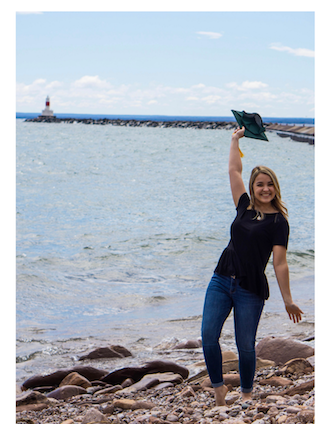When Chantel LaBlonde ‘21 BS was contemplating a major, she knew it had to be in a field that involved helping people. After observing therapy sessions and visiting the community-wide clinic at NMU, LaBlonde decided the Speech, Language, Hearing Sciences (SLHS) program was a perfect fit.

“It ended up being every single thing I was looking for,” LaBlonde said. “I have a knack for understanding people and their challenges. I have never been afraid of people who were different from myself. I found that this field has a variety of areas you can specialize in. There’s a lot to offer and you’re not just on one path.”
One out of every 10 people has a speech, language or hearing problem. Students enrolled in NMU’s SLHS program share the interest of helping these individuals overcome challenges. A degree in this program qualifies graduates to pursue a variety of careers in treatment, diagnosis and research. These careers can take them to research labs, schools, hospitals, rehabilitation clinics, nursing homes or private practices anywhere in the world.
For LaBlonde, being exposed to the variety of areas and specialties within speech, language, and hearing science was intriguing. Throughout her time in the program, she gained valuable experience by working closely with the knowledgeable faculty, building relationships with her peers and embracing hands-on experience with patients. She graduated this past May with three semesters of clinical experience and was also a teaching assistant to Diane Jandron, director of Clinical Education. She notes her time spent in the on-campus Speech-Language-Hearing Clinic as the most valuable.
“The clinic is crucial in connecting with real world experience. Being able to use equipment and learn how it works rather than reading about it in a book is valuable,” she said.
The emphasis of clinical training at the undergraduate level is a unique strength of NMU’s SLHS program. The Speech-Language-Hearing Clinic provides community-wide services performed by undergraduate students under the direct supervision of American Speech-Language-Hearing Association certified faculty. Patients travel from all over the region and ages vary from children to adults, seniors, and in-between. With the current utilization of telehealth, practices are able to reach individuals from even further across the region. Due to this clinical training experience, graduates leave the program well-prepared for graduate school.
One of LaBlonde’s most memorable moments is when it first “clicked'' that she was helping an individual build confidence in communicating with the world around them.
“I was working with a client who could not communicate with me at all. I had to figure out how we were going to communicate with each other. It makes you realize how hard that must be for the individual and their family.” she said. “It’s impactful to take someone’s experience and improve it dramatically. That’s my ultimate goal being in this field, to help somebody work through whatever challenge they are facing. We see that everyday in the clinic.”
According to LaBlonde, another unique aspect of the program is the strong bond formed by the students. Once in the program, students follow each other throughout their years at NMU. As a teaching assistant, LaBlonde was able to further build those connections, learning from her peers while also assisting them. She earned the nickname “IT” –– her knowledge of technology became an asset when telehealth took over.
In the fall, LaBlonde will be attending graduate school at the University of Wisconsin-Stevens Point to pursue a two year Speech-Language Pathology program. Once the graduate program is completed, LaBlonde will take what’s called the Praxis exam followed by a year-long clinical fellowship before becoming a certified Speech-Language Pathologist. She notes that her experience in NMU’s SLHS program and the strong relationships she built has left her feeling prepared for the next step.
While she entered the program wanting to pursue work in a hospital setting, being exposed to the clinic and variety of areas, diagnosis and age groups has left her eager to further explore future options.
“I came into this program thinking I wanted to work with adults in the medical field. Now I’m conflicted, which is okay –– the point of graduate school is to explore all those areas and be prepared to work with all individuals of different diagnosis or ages,” LaBlonde said. “I enjoy working with senior populations –– I’m open to all of it. I am excited to learn more about areas I am interested in, such as traumatic brain injuries and strokes.”
NMU’s Speech-Language-Hearing Clinic is located in the West Science building on NMU’s campus. The clinic is continuing to grow and offers a variety of services related to the difficulties persons can have in communicating with others, including:
- Speech, language and hearing screenings
- Speech and language evaluations
- Individual and group speech-language therapy
- Consultations with schools, physicians and employers
- Services for infants, children and adults
- Public information regarding speech, language, hearing and related disorders.
Services are open to community members throughout the Upper Peninsula at not cost. A referral is not needed. Patients or parents must contact the NMU Speech-Language and Hearing Clinic at 906-227-2125 or via email at nmuspeechclinic@nmu.edu to request an appointment.
For more information on the Speech, Language, Hearing Sciences program at NMU, visit nmu.edu/clinicalsciences/slhs.
--
The Northern Michigan University Center for Rural Health seeks to improve the health and well-being of Upper Peninsula residents and communities by developing collaborative partnerships that enhance the access and availability of affordable, quality healthcare services. For questions or comments related to this story, contact ruralhealth@nmu.edu.
